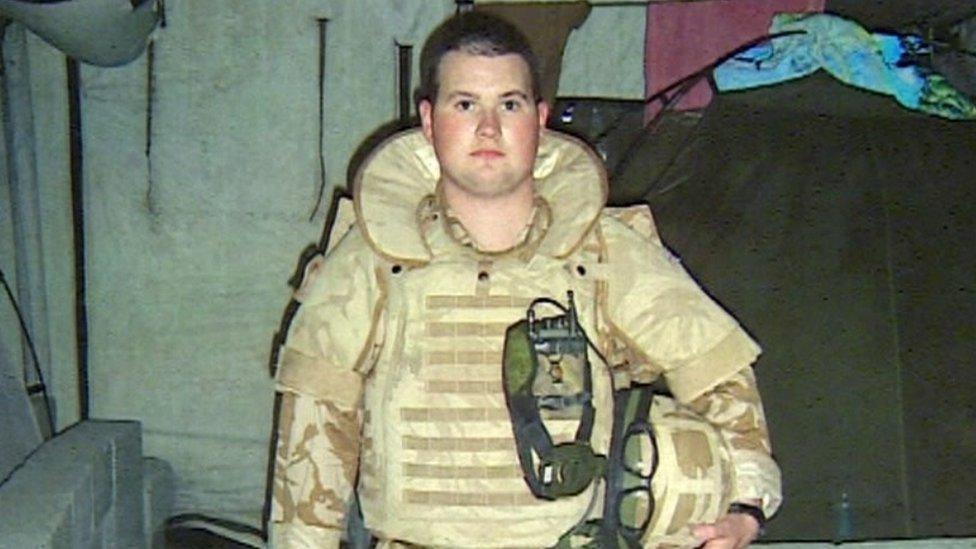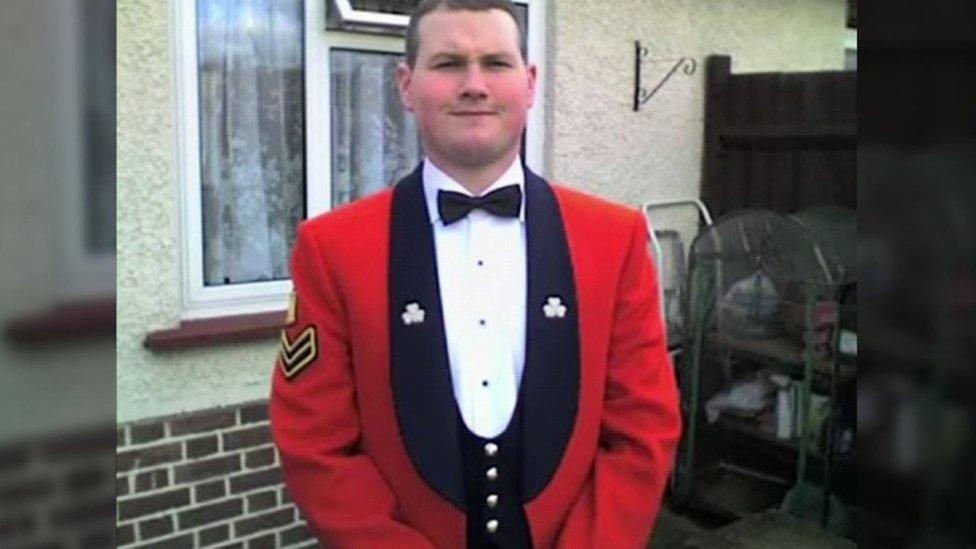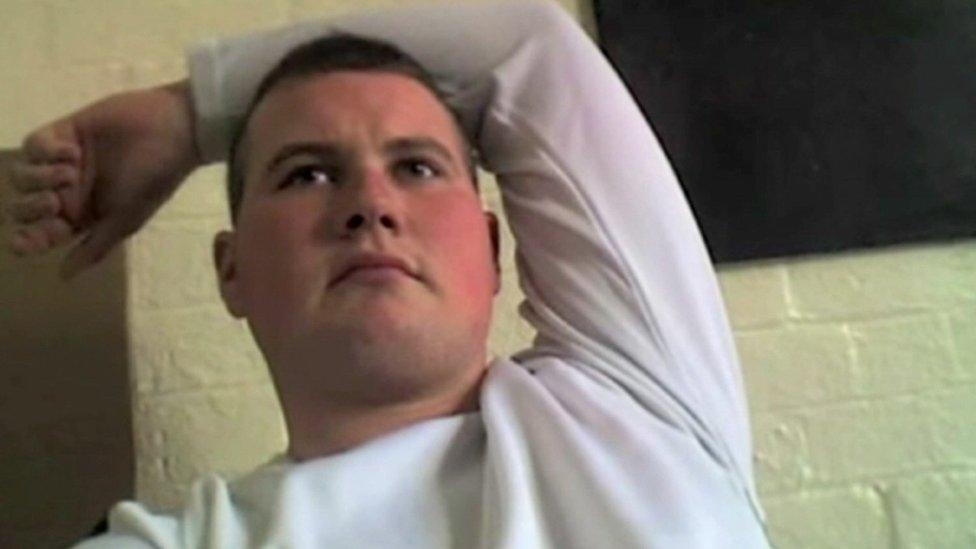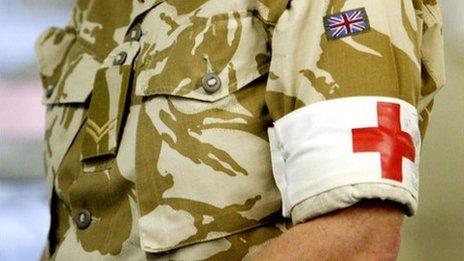Killed soldier's dad says compensation plans are 'wrong'
- Published

Lance Corporal Kirk Redpath was killed in 2007
The father of a soldier killed in Iraq has criticised proposals by the Ministry of Defence to scrap the legal duty of care it owes to service personnel in the course of combat.
Under the proposed scheme, personnel would no longer be able to sue the MoD for negligence.
Compensation would instead be awarded by an MoD-appointed assessor.
The MoD said the proposals, which are being consulted on until next week, would lead to "better compensation".
But Colin Redpath, whose son was killed in Iraq, told the BBC the proposal was "wrong".
Colin Redpath: "I got a knock at the door at 04:30"
'There's no comeback'
In 2007, Lance Corporal Kirk Redpath, a keen drummer in the Irish guards, died when a roadside bomb exploded next to his lightly-armoured Snatch Land Rover in Iraq.
He was one of some 37 servicemen and women killed in Snatch Land Rovers in Afghanistan and Iraq.
After a five-year struggle, his father Colin won a Supreme Court ruling allowing him the right to sue the MoD.
That claim he brought is only now close to a conclusion.

Lance Corporal Kirk Redpath was killed by a roadside bomb in Iraq
He said: "At the end of the day, they are an employer.
"The fire brigade, the police, the ambulance service, they all have to go out with equipment that works. And the right equipment. That should be the same for a soldier.
"If not, then what the MoD are saying is that we could send our boys and girls out with broomsticks. It wouldn't matter. There's no comeback."
The MoD's proposals cover battle and the preparations for it, and include:
Abolishing the legal duty of care it owes to service personnel and stopping legal claims for negligence against the MoD in the courts
A "no fault" compensation scheme for injured service personnel and families of those killed
Assessors to be appointed by the MoD to value injuries and loss based on expert reports they commission
A presumption that there will be no paid legal representation for service personnel when losses and compensation are assessed
'In-house compensation system'
There is already a concept of "combat immunity" which means decisions taken in "the heat of battle" cannot be second-guessed by the courts.
Claims in negligence cannot be brought in relation to battlefield acts or omissions.
The MoD is proposing to widen the concept of combat immunity to include all deaths and injuries in combat, including where the failings occurred far from the battlefield, for instance in failing to provide adequate equipment.
Conservative MP and former army soldier Iain Duncan Smith said he supported the proposals after growing concerned about the use of courts to assess combat issues.
He added: "It doesn't seem to me like the courts are the right place to be.
"Issues surrounding combat are often very difficult to judge against a standard common law process. I think dragging things through the courts satisfies only lawyers."
In July 2016, Sir John Chilcot's Iraq Inquiry Report identified numerous MoD failings in preparing for the Iraq War which were described as "wholly inadequate".
They included being slow to respond to the threat from improvised explosive devices and delay in replacing the poorly-armoured Snatch Land Rovers.
Chilcot identified a failing to have in place a system for identifying gaps in capability.
Lawyers say that without the duty of care owed to service personnel there is a real danger that the lessons of Chilcot will not be learned.
Some solicitors who have represented service personnel in actions against the MoD make the point that the duty of care owed to soldiers puts their safety at the centre of the defence agenda.

Kirk's father won the right to sue for compensation for his death
The Law Society of England and Wales says that without it, MoD officials making decisions on equipment and procurement know that cases will not be heard by an independent judge.
It argues that facts will not be independently investigated, responsibility will not be established and a state institution, if liable, would not be held to account.
The society's president, Robert Bourns, also fears the compensation system being taken in-house.
He said: "You've suffered injury, you think that the employer, the MoD, is at fault - and yet you are expected to rely on the MoD to assess the compensation that it should pay you for the damage that it has caused you.
"That's not right."
'Vulnerable and traumatised'
Labour MP Madeleine Moon, who sits on the Defence Select Committee, said she was concerned about the quality of equipment provided by the MoD after budget cuts.
She added: "Now they're going to give themselves immunity from failing to provide the quality of equipment and the quality of training that they should provide before people go into combat."
The MoD stresses that assessors will be independent, experienced and legally qualified, and that awards will be "equal to what a court would have awarded if it had found the government to have been negligent".
A spokesman said: "This is about better compensation and, regardless of legal action, we already prioritise learning lessons from any incidents involving the safety of our personnel.
"Where there have been serious injuries or fatalities, we have robust systems and processes in place that allow us to record and investigate these accordingly, and in the unfortunate case of a death, the requirement for an independent inquest to determine the cause will of course remain."
Jocelyn Cockburn, a solicitor from the firm Hodge, Jones and Allen, who has represented the families of some of the service personnel killed in Snatch Land Rovers, is worried the proposals deny injured soldiers and families of those killed paid legal representation in the process of assessing compensation for injuries.
"Cases may be very complex with the need for multiple experts to help assess the extent of the injuries and losses.
"Servicemen and women are likely to be very vulnerable and traumatised, some will have catastrophic injuries and some may have poor literacy levels.
"They cannot be expected to navigate the process without legal representation."
- Published6 August 2014
